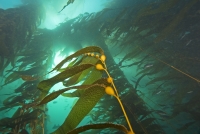Health Benefits of Marine Nutrients
Marine plants, either marine algae or seaweeds, were part of the daily diet of our ancestors and have been consumed in different parts of Asia for centuries. Although plants like kelp, nori, dulce, and spirulina are more commonly used in sushi, Asian soups, snacks, or seasonings, there are many other varieties of sea plants packed with important nutrients. These sea vegetables absorb beneficial nutrients from the ocean and are very good sources of protein, fiber, healthy polyunsaturated fats, antioxidants, and vitamins and minerals. For example, after iodized salt they are the second richest source of iodine, and it is well known that iodine is critical for a healthy thyroid gland. Thyroid hormones - thyroxine (T4) and tri-iodothyronine (T3) - play a vital role in growth and development of the body and in regulating various metabolic processes, including basic metabolic rate, healthy functioning of the brain, heart, immune and digestive systems, and building strong muscles and bones. Two sea plants which contain critical nutrients for overall health are Irish moss and bladderwrack.
Irish moss is a type of red seaweed that grows on the Atlantic side of Europe and North America. The red-brown color of Irish moss is due to fucoxanthin a marine carotenoid. Traditionally, it was used as a respiratory tonic to relieve congestion, coughs and sore throats, to treat skin conditions, and to generally nourish the skin. In addition to vitamins A, C, E and some of the B group, it is also a rich source of amino acids that form collagen in the body. It is one of the few food sources of the amino acid taurine and omega-3 fatty acids such as EPA, both of which are important for cardiovascular health but are absent in vegetarian and vegan diets. Moreover, Irish moss is one of the richest sources of iodine and selenium, the essential nutrients for a healthy thyroid gland. Fucoxanthin, along with the other carotenoids present in Irish moss, has a role to play in maintenance of normal blood sugar. Irish moss is a good source of iron that helps in increased hemoglobin and prevents anemia. Studies have proven that antioxidants in Irish moss protect from free radical damage caused by UV rays, environmental pollutants, smoking and other harmful elements. Its anti-inflammatory properties help in reducing pain and swelling in arthritis and increase mobility by increasing joint lubrication. It is rich in fiber and is a great digestive aid and is sometimes used for weight management. The jelly-like properties of this seaweed provide a coating on the digestive tract and may help in soothing some of the stomach or intestinal ulcers.
Bladderwrack is a leathery type of brown seaweed growing on the northern Pacific and Atlantic coasts of the USA and the northern Atlantic and Baltic coasts of Europe. The name bladderwrack is derived from its air-filled pods or bladders that help the algae float. Similar to Irish moss, bladderwrack is a very rich source of many vitamins including A, B12, C, and D, and minerals such as iodine, calcium, magnesium, potassium, and zinc. This nutrient packed seaweed supports thyroid health, regulates metabolism, and helps in stronger immunity, as well as growth and development of the nervous and musculoskeletal systems. Additionally, bladderwrack contains phytochemicals such as fucoxanthin, phlorotannin, and fucoidan. Fucoidan is known for its vitamin C-like properties including cardiovascular benefits, and maintenance of normal blood glucose, cholesterol, and blood pressure.1 The phytochemicals, fucoxanthin and phlorotannin, contribute towards its anti-inflammatory and antioxidant properties and it is known to aid in constipation due to the presence of alginic acid, a soluble fiber, and calcium alginate aids in wound healing. Owing to its high mucilage and demulcent properties, bladderwrack protects against irritation and inflammation of the digestive tract.
In summary, Irish moss and bladderwrack, when combined together promote healthy functioning of the thyroid gland, the joints, the digestive, cardiovascular and nervous systems and health overall.
Ref:
- V. Ivanov et al. Seaweed – a substitute for ascorbic acid. J CM & NH, June 2016
